Samsung Galaxy S23: Two-minute preview
Samsung’s eagerly-anticipated flagship, the Samsung Galaxy S23 is here, and it ticks virtually every box of leaked information out there about it.
As anticipated, the Galaxy S23 and Galaxy S23 Plus both dropped the contour. In Samsung’s newest handset line, the S23 series, the raised bit of metal surrounding the camera array is gone. It’s a cleaner look that makes this 6.1-inch phone, and its larger 6.6-inch sibling, look a lot more like the rest of the smartphone pack. You can read our hands-on Samsung Galaxy S23 Plus review and our hands-on Samsung Galaxy S23 Ultra review for more on those phones.
The story of the Samsung Galaxy S23, though, is not so much the cleaned-up looks as it is what is now inside of it. All three of Samsung’s new flagship phones feature the new Qualcomm Snapdragon 8 Gen 2 Mobile Platform for Galaxy.
It’s a nifty, bespoke name that defines one little bit of special sauce within these Android 13 handsets: all the mobile CPUs are overclocked to what may be an industry-leading 3.36 GHz. Do you need that kind of power in a smartphone, especially when the current and previous generations of Qualcomm and Apple mobile CPUs already offer more power than most phones can use? It’s conceivable the extra power could mean better 8K 30 fps capture, smoother gaming, and more powerful CPU-intensive operations like 8K video editing.
In my limited hands-on there wasn’t time to test or benchmark that performance. Still, that CPU is central to the ongoing story of the Samsung Galaxy S23 lineup which includes the Galaxy S23, the Galaxy S23 Plus, and the bold Galaxy S23 Ultra.
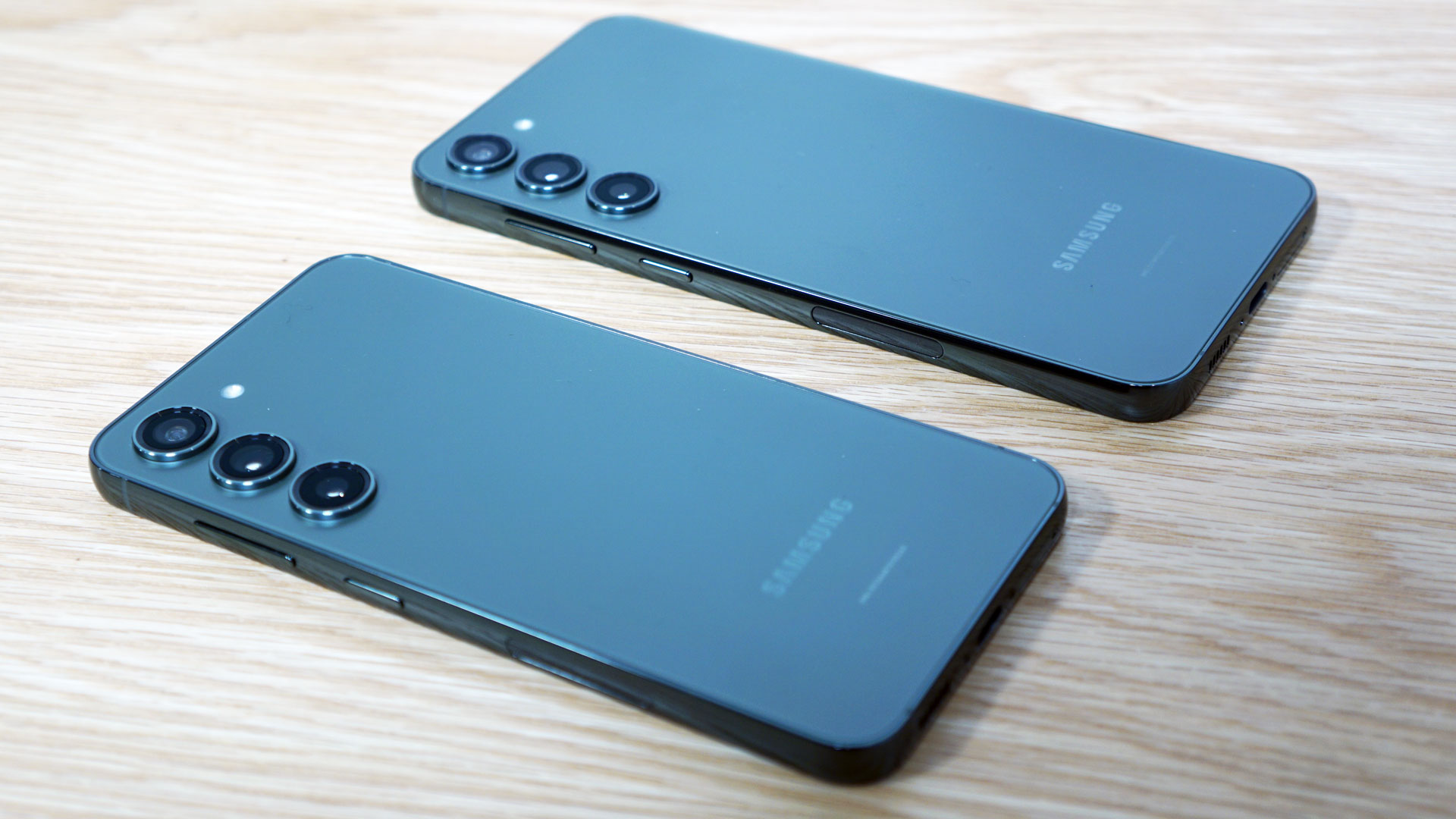
Instead of taking the Samsung Galaxy S22 Ultra‘s impressive camera array and 1080MP sensor and migrating it down to the new Galaxy S23 line while the new S23 Ultra gets a 200MP sensor, Samsung opted to leave the S23 camera array largely unchanged. It’s still a 50MP wide, 12MP ultrawide, and a 10MP optically stabilized 3X optical zoom camera. The front camera is now 12MP instead of the 40MP that let you shoot 10MP 4-in-1- pixel-binned photos. Samsung is claiming better photography mostly through the power of the upgraded CPU and its more powerful AI features.
While in no way a definitive test, I was impressed with the camera performance.
Like the cameras, Samsung didn’t fiddle much with the 6.1-inch Dynamic AMOLED 2X Infinity-O FHD+ display. There’s still an ultrasonic fingerprint reader underneath and the selfie camera drill through near the top. Everything still looks bright and colorful. Samsung did up the adaptive refresh rate capabilities so now they step all the way down to 1hz and still go up to a buttery-smooth 120hz.
The Samsung Galaxy S23 is, in most ways that matter, a duplicate of the larger Galaxy S23 Plus. But there are some key differences.
Samsung kept the dimensions virtually unchanged since the S22, but the Galaxy S23 is not just smaller than the S23 Plus.
Inside the lovely Gorilla Glass Victus 2 (brushed back, glossy front) and Armor Aluminum body is the Samsung Qualcomm chip but half the base storage (128GB to start) and a smaller battery. At least the 3,900 mAh battery is 200 mAh larger than that of the Galaxy S22. The S23 also lacks the Plus’ improved cooling system and UWB (ultra-wideband).
As it stands, this isn’t a must-upgrade flagship, but it could be just the right price, size, and more than enough performance and camera capabilities from someone looking to jump on the Samsung Galaxy bandwagon.
I’ll withhold final judgment until the full review
Samsung Galaxy S23 hands-on: Price and availability
- Starts at $799.99 / £769 / AU$1,249
- Same price as last year
- Will we be wishing there were more improvements?
| RAM / Storage | US price | UK price | AU price |
| 8/256GB | $799.99 | £769 | $1,249 |
| 8/512GB | $849 | £819 | $1,349 |
Samsung launched the Samsung Galaxy S23 (along with the Galaxy S23 Plus and Galaxy S23 Ultra) and February 1. The handset is available for pre-order now and will ship on February 17.
At $799.99 / £769 / $1,249, pricing on the Galaxy S23 Plus remains unchanged since last year. Considering the new design, upgraded materials, and that powerful, custom Snapdragon 8 Gen 2, this is good news. On the other hand, you might look at all you get with the larger (and more expensive) Galaxy S23 Plus and wonder why you didn’t go for the extra storage and bigger display.
Your head might even be turned by the Galaxy 23 Ultra, which offers more memory (12GB), the possibility of up to 1TB of storage, and that 200MP image sensor.
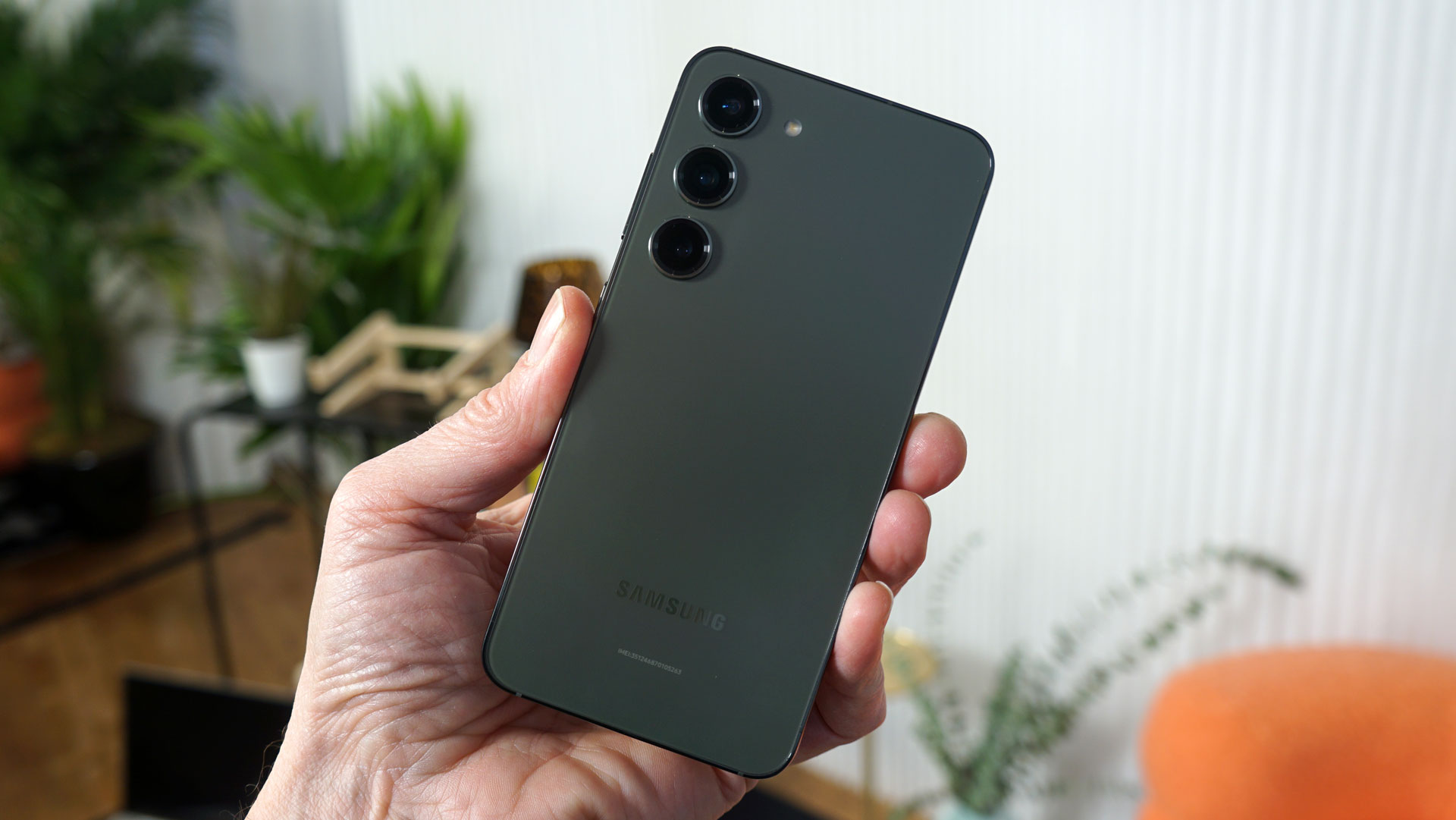
Samsung Galaxy S23 hands-on: Specs
The Samsung Galaxy S23 comes in two storage variations, 128GB and 256GB, both will have 8GM of RAM.
| Samsung Galaxy S23 128 GB | Samsung Galaxy S23 256 GB | |
|---|---|---|
| Price: | $799.99 / £769 / AU$1,249 | $849 / £819 / AU$1,349 |
| Dimensions: | 70.86 x 146.3 x 7.62 mm | 70.86 x 146.3 x 7.62 mm |
| Weight: | 168g | 168g |
| OS: | Android 13 | Android 13 |
| Screen Size: | 6.1 inch | 6.1 inch |
| Resolution: | 2316 x 1080 pixels | 2316 x 1080 pixels |
| CPU: | Qualcomm Snapdragon Gen 8 2 Mobile Platform for Galaxy | Qualcomm Snapdragon Gen 8 2 Mobile Platform for Galaxy |
| RAM: | 8GB | 8GB |
| Storage: | 128GB | 256GB |
| Battery: | 3,900 mAh | 3,900 mAh |
| Rear Cameras: | 50MP Wide, 12MP Ultrawide, 10MP telepoto | 50MP Wide, 12MP Ultrawide, 10MP telepoto |
| Front Camera: | 12MP | 12MP |
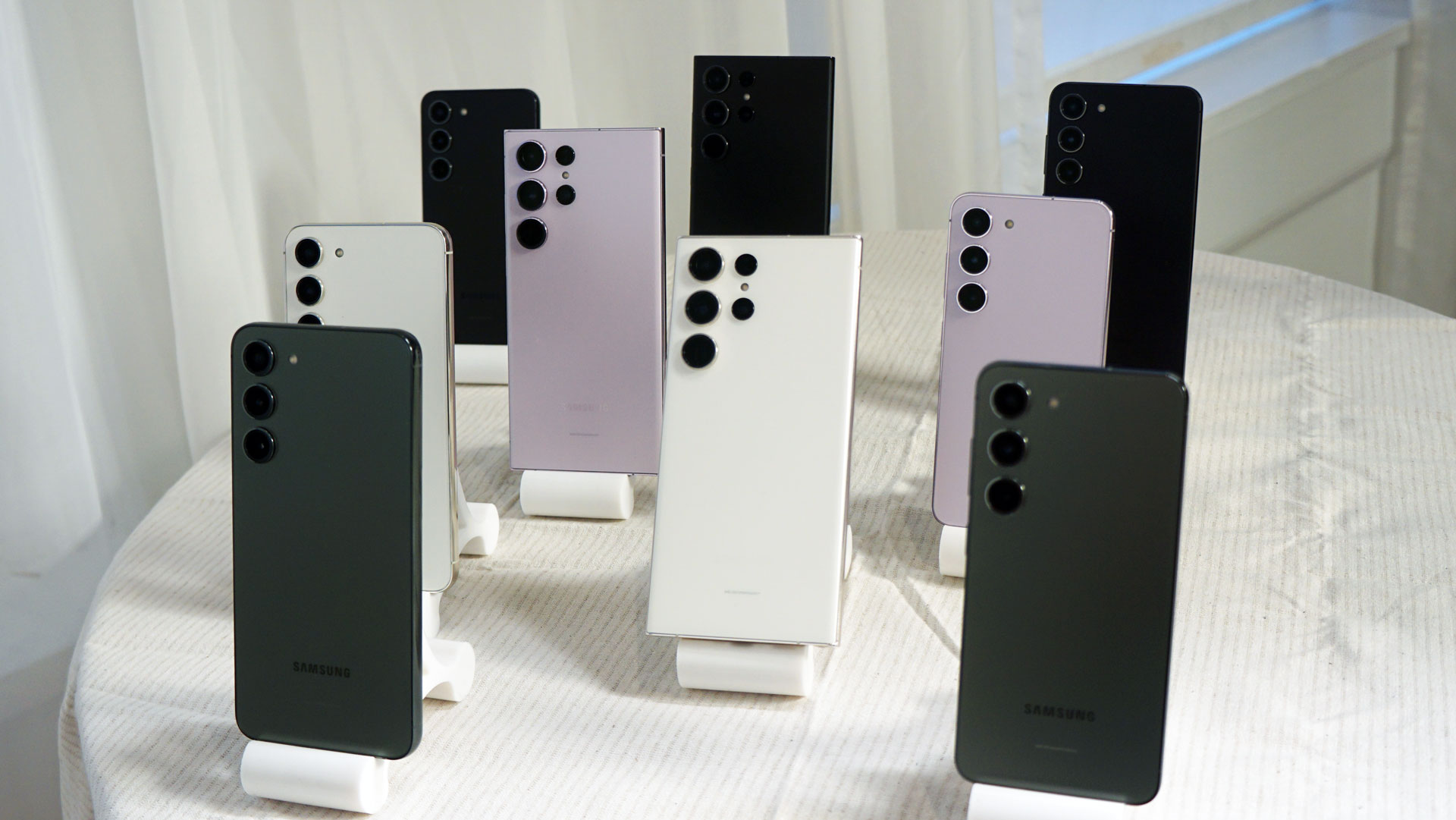
Samsung Galaxy S23 hands-on: Design
- The contour is gone and a cleaner look is in
- Excellent look, feel, and materials
- Nice Gorilla Glass update
Even though Samsung dropped the signature contour, that island of raised metal that surrounded the S22’s camera array, it manages to keep most of the other elements unchanged
Without the contour, the Galaxy S23’s three rear cameras float on the upper left side of the 6.1-inch brushed glass Gorilla Glass Victus 2 back. The front is also Gorilla Glass Victus 2, but glossy instead of brushed.
It’s a familiar and classy look that I think I like.
At 70.86 x 146.3 x 7.62 mm the Galaxy S23 is essentially the same size and weight (168g). It’s a nice, light little phone that, thanks to the slightly curved metal band that encompasses the device, felt good in my hand. Perhaps not coincidentally, the Samsung Galaxy S23 is almost the exact same size as my iPhone 14 Pro.
There are some other minor structural adjustments like the power and volume buttons moving a bit lower and the antenna bands shifting around a bit.
The bottom of the phone looks pretty much the same as the S22 with a centered USB-C port, mic holes, a speaker grill, and, yes, a physical SIM slot.
For the first time, some external portions of the device are made, in part, from recycled materials, including the volume and power buttons and the speaker grill at the very top of the display. In addition, Gorilla Glass Victus 2 includes some recycled glass and some of the phone’s packaging is made from recycled materials. Even the plastic cover you’ll peel off the screen is partially recycled.
There is also a nice collection of colors to choose from. I saw Cream, Phantom Black, Lavender, and Green. There will be additional exclusive colors, like Red, available only through Samsung.com.
The entire line of Galaxy S23 devices are IP68 rated, which means a drop in water and dust should not bother any of them.
Samsung Galaxy S23 hands-on: Display
Since the Galaxy S23 and S23 Plus share almost the exact same Dynamic AMOLED 2X Infinity-O FHD+ display, the S23 does outdo the S23 Plus model on pixels per inch: 425ppi vs. 393ppi
The Samsung Galaxy S23 Plus’s 6.1-inch screen is flat and has the tiniest black bezel surrounding it. It’s also big, bright (max nits of 1,750), and responsive. The default Adaptive refresh rate mates the screen refresh needs to your activity (or lack of it) down to 1hz. I noticed smooth scrolling motion and action in the YouTube videos I played. The phone also still supports 240Hz touch-sampling for speedy gaming response. Again, not something I could test.
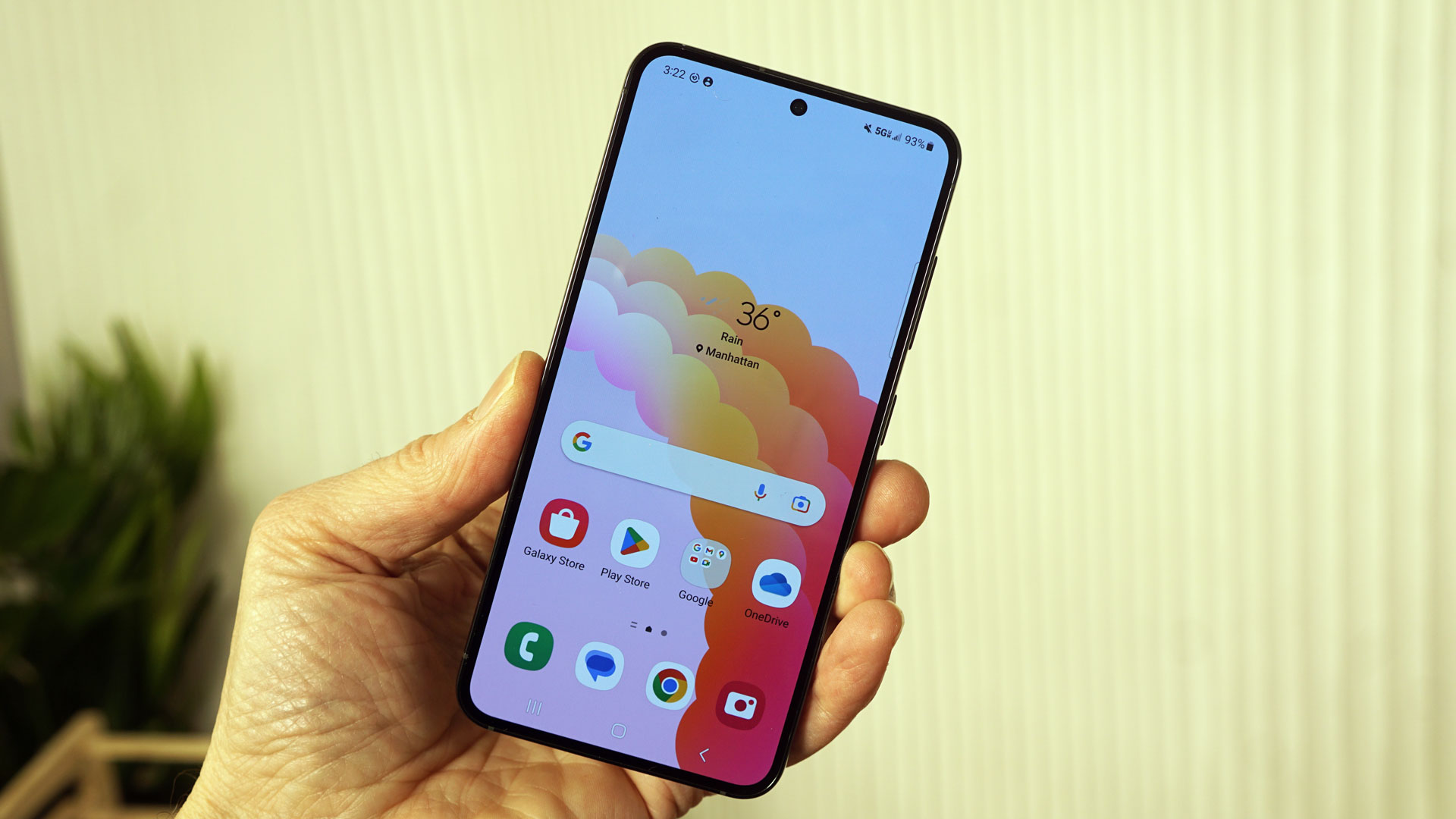
I tried turning off the Adaptive refresh rate (it’s on by default) in settings and noticed that the screen scrolling was different. Not bad just not quite as smooth.
The phone’s adaptive brightness system now includes more steps to properly adjust for your various viewing environments. This was something that was hard to see in my brief hands-on experience.
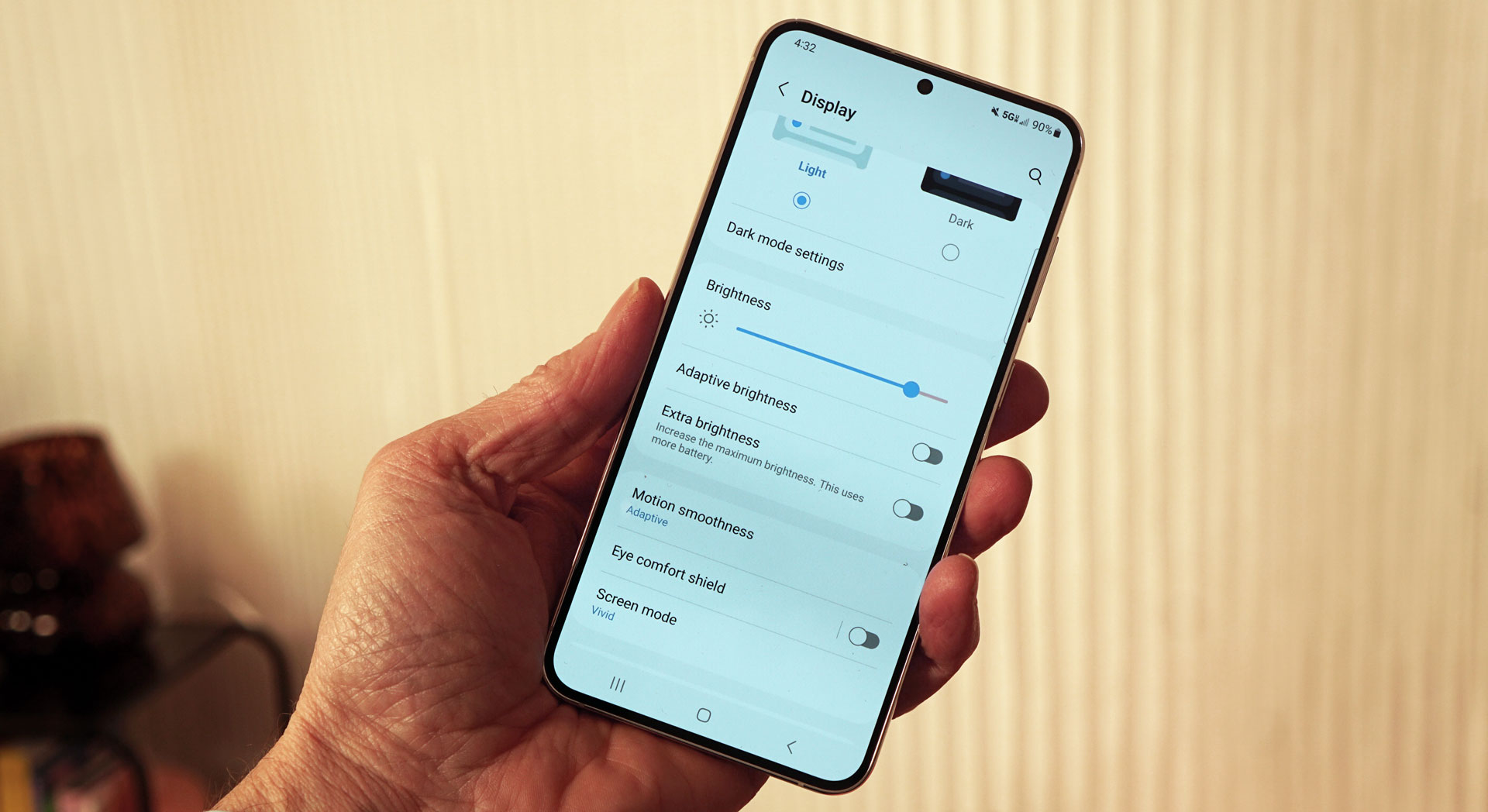
Samsung Galaxy S23 hands-on: Cameras
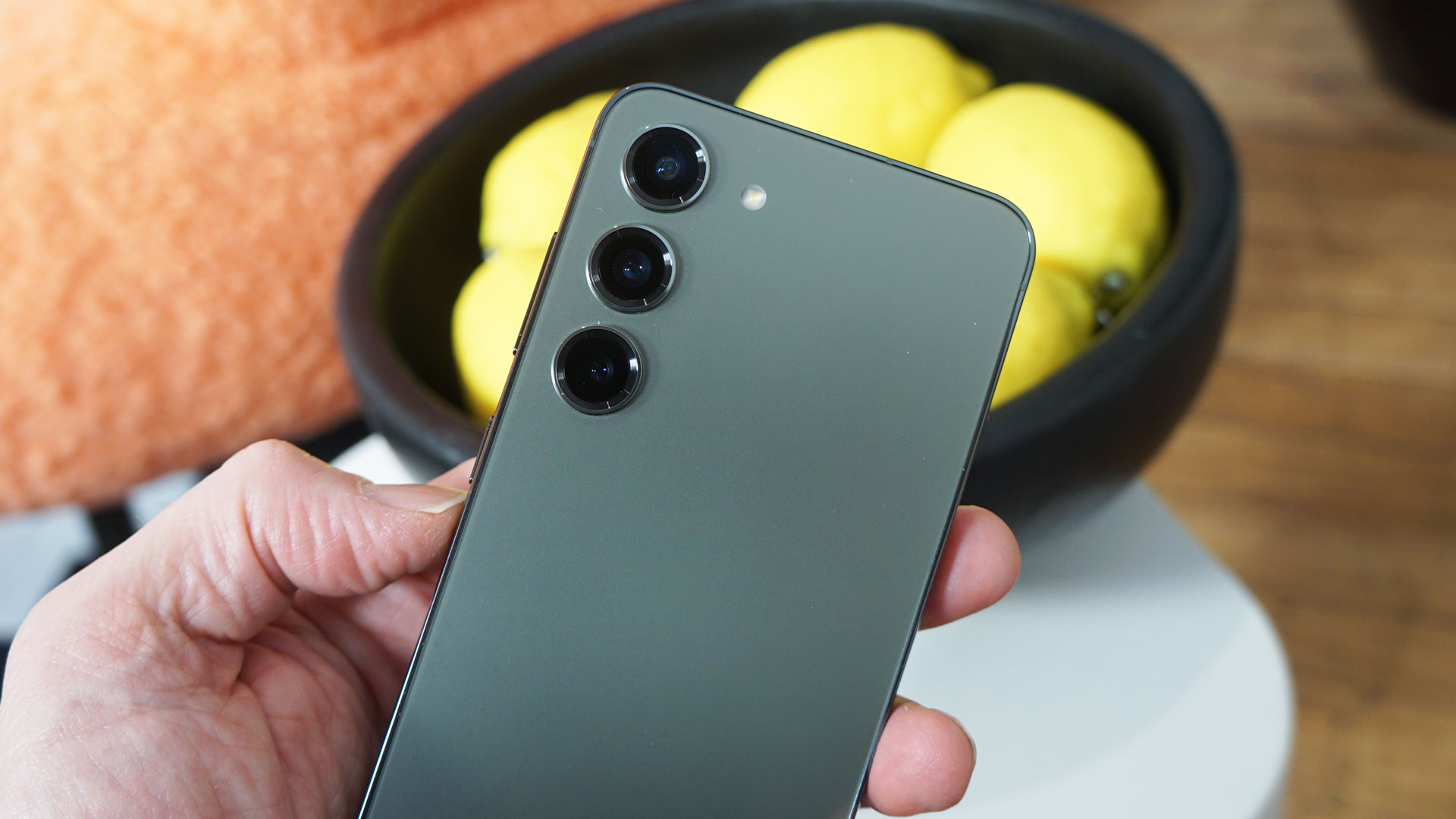
At first, I thought the lenses on the tri-camera array were larger than those on the Galaxy S22 but I think that was an optical illusion created by removing the raised metal around them.
The lenses appear to be almost exactly the same as those we had on the S22. I wish Samsung had decided to move the Galaxy S22 Ultra’s amazing camera system down to the base S23 line, but no such luck.
At least they’re all backed up by a new image processor on the Qualcomm Snapdragon 8 Gen 2.
The three main rear cameras are:
- 50MP (OIS), f1.8 wide
- 12MP, f2.2 ultrawide
- 10MP(OIS), f2.4 telephoto (3X)
In my brief experience with these cameras, I was pleased with the result.
I used each lens to take photos of a studio, including plants, fake flowers, books, and myself.
The photos all looked good, clear, and color-accurate. The detail in all was good. You’ll shoot most of your photos with the 50MP main wide-angle camera which shoots, essentially 12MP photos with 4-to-1 pixel binning. You can choose to shoot in 50MP mode, which is a tad slow, and then you’ll see a lot more detail in every photo.
The camera performance was identical to that of the Galaxy S23 Plus.
Samsung is promising improved Nightography. To test lowlight performance, I took some photos of plastic lemons from under a heavy blanket. The result was better than I expected.
On the front is a new 12MP camera. That’s a change from the 40MP selfie camera that automatically shot in 10MP 4-to-1 pixel binning mode. I took good selfies in regular and portrait mode.
Samsung Galaxy S23 hands-on: Performance and audio
- Promises of industry-leading performance
- Early interactions were smooth and peppy
The Samsung Galaxy S23 Plus (and all S23 devices) are running the Qualcomm Snapdragon 8 Gen 2 Mobile Platform for Galaxy, a bespoke version of the standard mobile CPU overclocked to 3.36GHz.
Obviously, I couldn’t benchmark the phone to verify that number. Even so, I can report that the phone was responsive. I look forward to more tests when I get my hands on a review unit.
To get a sampling of the S23’s audio prowess, I played a Youtube video of the new Dungeons and Dragons trailer, which looks like fun, by the way. It was louder than expected (everyone turned to look at me). I lowered the volume a bit and was impressed with the stereo audio. Dolby Atmos, which you can add through settings, added a bit to the vibrancy and clarity.
The entire Galaxy S23 line is 5G-capable. I did not try to make a call.
One thing Samsung is not currently touting is any kind of satellite connectivity. Given the current competitive environment, that’s a little surprising. Apple, for instance, introduced Emergency SOS via Satellite with the iPhone 14 line and Qualcomm showed how a Snapdragon 8 Gen 2 -equipped demo device could send and receive texts over satellite.
Both the S23 and S23 Plus pair the Snapdragon 8 Gen 2 with the X70 5G modem, the same one Qualcomm told me is capable of Satellite communications.
However, Samsung is so far mum about those capabilities on the Galaxy S23 line. Maybe they’ll light it up later this year with a software update and some carrier support.
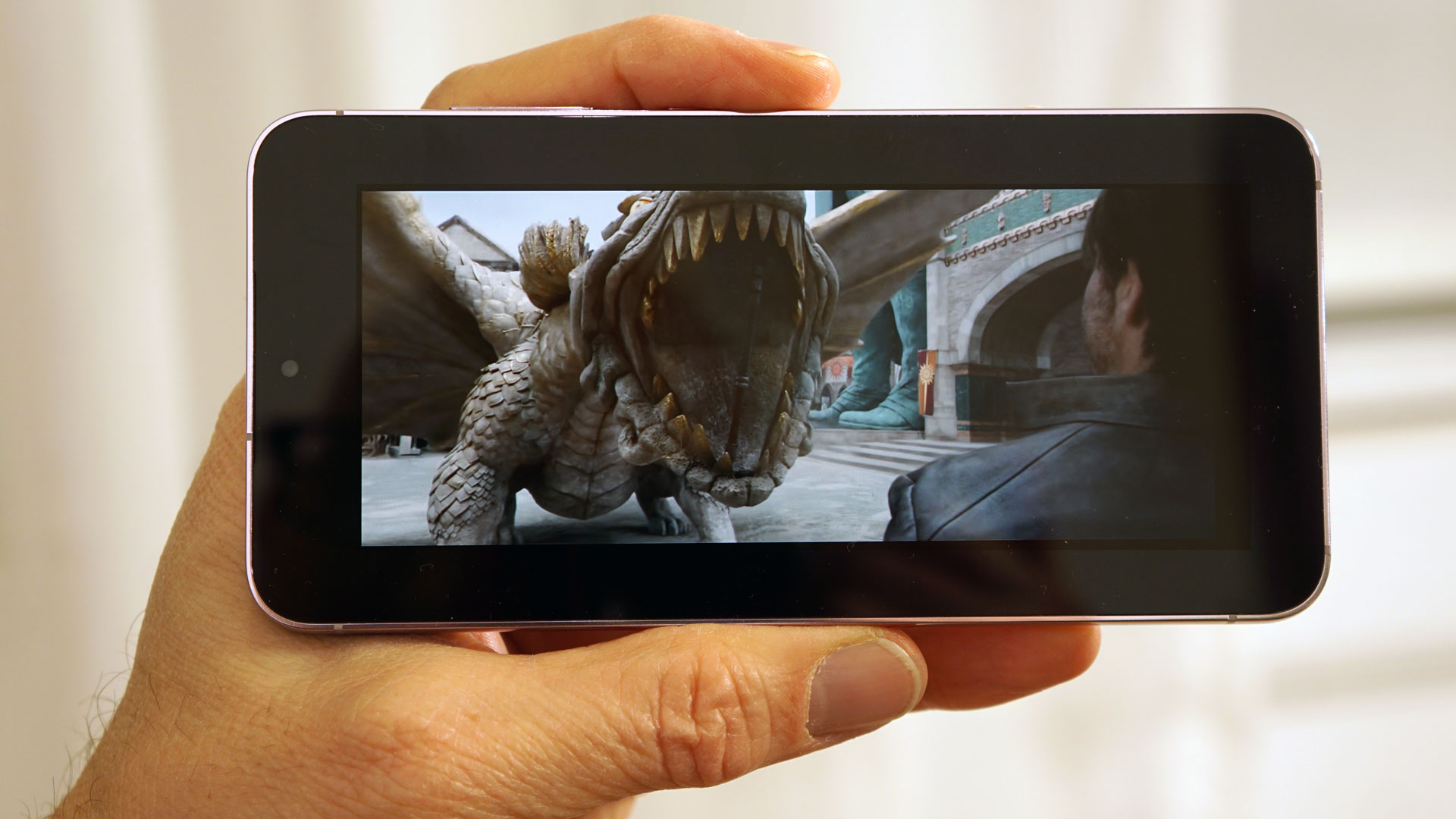
Samsung Galaxy S23 hands-on: Software
The entire Samsung Galaxy S23 line will ship with Android 13 and the OneUI 5.1 overly. Samsung is promising four generations of OS upgrades and five years of security upgrades.
Overall, the software experience is very familiar and virtually unchanged from the S22 line. That said, Samsung has introduced a number of new software features that I did not have the opportunity to test, including better Samsung Notes (co-create features), co-watching in Google Meet, and enhanced security features. The latter adds the ability to set your S23 in Maintenance Mode so all your data is protected while someone works on the Galaxy S23 phone.
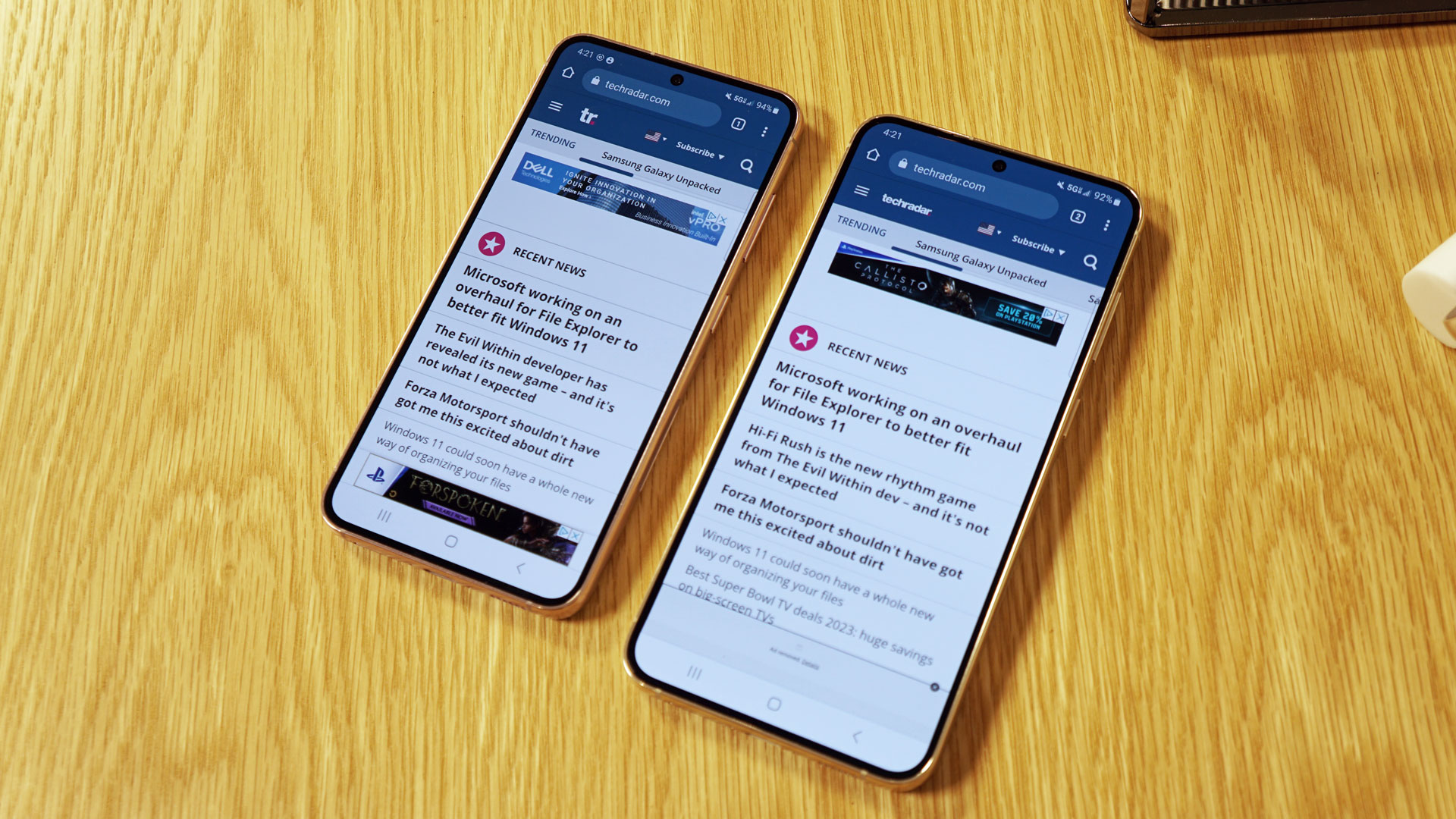
Samsung Galaxy S23 hands-on: Battery life
With the Samsung Galaxy S23, you get a decent 3,900 mAH battery that’s 200 mAh larger than that of the Galaxy S22. What that translates to in real-world use, I can’t say, though it’s fair to assume all-day battery life with regular use,. I will be curious to see how the extra mAH and a more efficient 4-nanometer Snapdragon 8 Gen 2 work together to possibly extend battery life.
The phone supports Super Fast wired charging fast wireless charging and wireless PowerShare if you want to charge your Galaxy Buds Pros or another Galaxy S22 or S23 off the back of the new device. I couldn’t test any of these features.
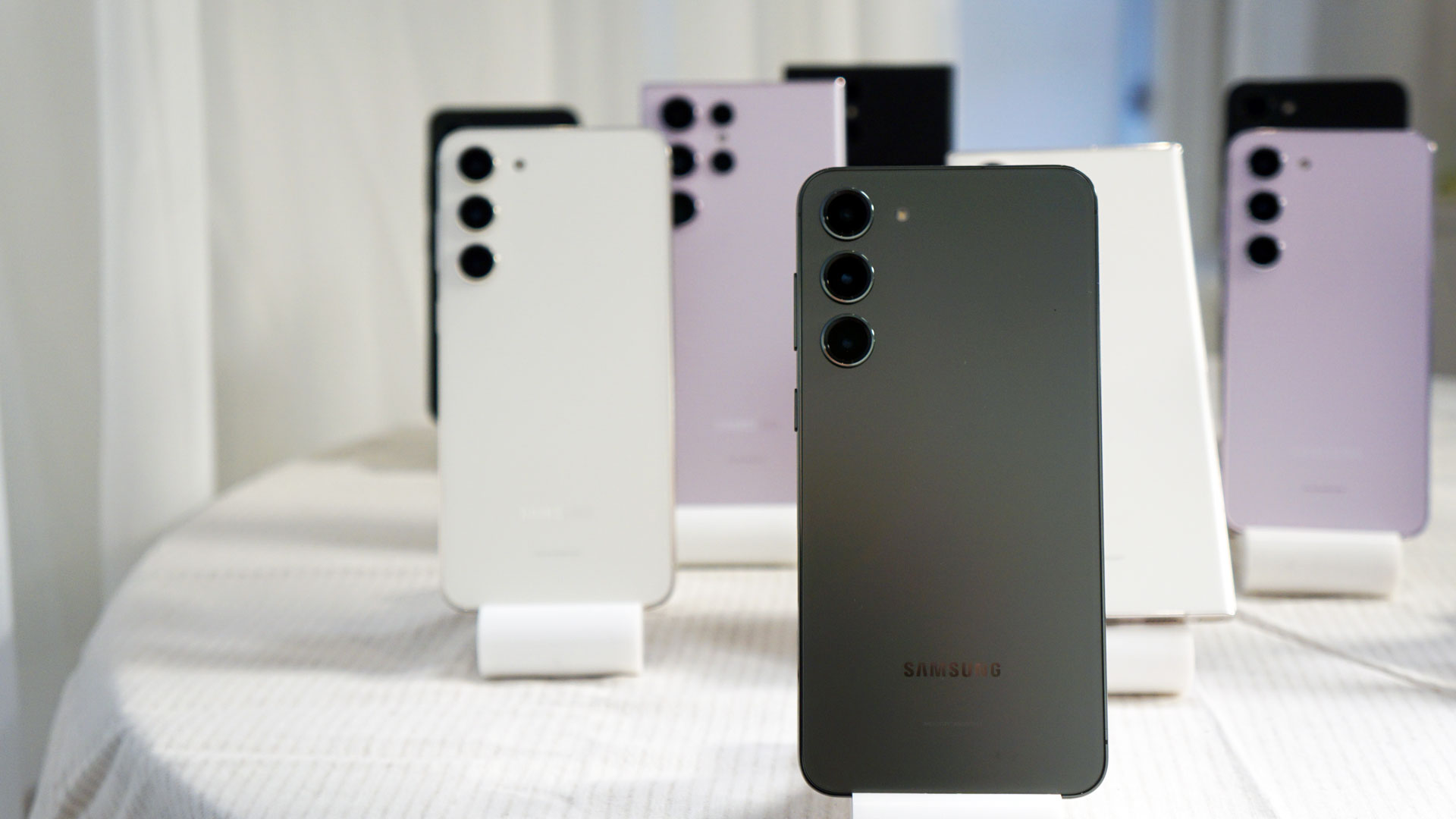
Overall, the Samsung Galaxy S23 is a solid and attractive upgrade with the new mobile CPU being a possible highlight, offering better performance and improved photography.
It’s not shaping up to be a must-upgrade device, but I still think it has a chance to join our best smartphones of the year list. I’ll know more once I run a full battery of tests on a review unit.
Samsung Galaxy S23 hands-on: Also consider
| Samsung GalaxyS22 Plus | Apple iPhone 14 Pro | Apple iPhone 14 Plus | OnePlus 10 Pro | Google Pixel 7 Pro | |
|---|---|---|---|---|---|
| Price: | $999 / £949 / $1,549 | $999 / £1,099 / AU$1,749 | $899 / £949 / AU$1,579 | $899 / £799 (roughly AU$1,400) | $899 / £849 / AU$1,299 |
| Dimensions: | 157.4 x 75.8 x 7.6mm | 71.5 x 147.5 x 7.85mm | 160.8mm x 78.1mm x 7.8mm | 163 x 73.9 x 8.6mm | 162.9 x 76.6 x 8.9 mm |
| Weight: | 195g | 206g | 203g | 201g | 212g |
| OS: | OneUI / Android 13 | iOS 16 | iOS 16 | Android 12 | Android 13 |
| Screen Size: | 6.6 in. | 6.1 in. | 6.7 in. | 6.7 in. | 6.7 in. |
| Resolution: | 1080 x 2340 | 2556 x 1179 | 2278 x 1284 | 3216 x 1440 | 3120 x 1440 |
| CPU: | Qualcomm Snapdragon 8 Gen 1 | A16 Bionic | A16 Bionic | Qualcomm Snapdragon 8 Gen 1 | Tensor G2 |
| RAM: | 8GB | 6GB (est) | 6GB (est) | 8GB | 12GB |
| Storage: | 128GB | 128GB | 128GB | 128GB | 128 GB |
| Battery: | 4,500mAh | 3,200mAh | 4323 mAh | 5,000mAh | 5,000mAh |
| Rear Cameras: | 50MP f/1.8 main, 12MP f/2.2 ultrawide, 10MP f/2.4 telephoto for 3x optical zoom | 48MP wide (24mm f/2.8), 12MP ultra-wide (13mm f/2.2). 12MP telephoto (77mm f/2.8) | 12MP 26mm, f/1.5 lens, 12MP 13mm, f/2.4 ultrawide | 48MP main, 50MP ultra-wide and 13MP telephoto | 50MP main, 48MP 5x zoom, 12MP ultra-wide macro |
| Front camera: | 10MP f/2.2 | 12MP | 12MP f/1.9 | 32MP f/2.2 | 10MP |





